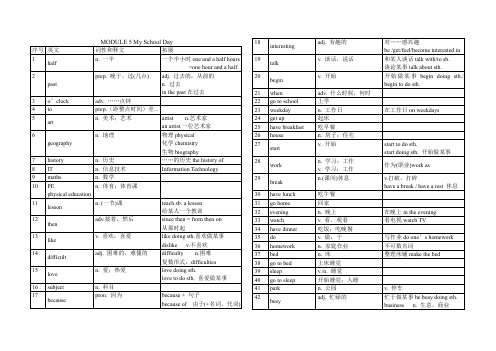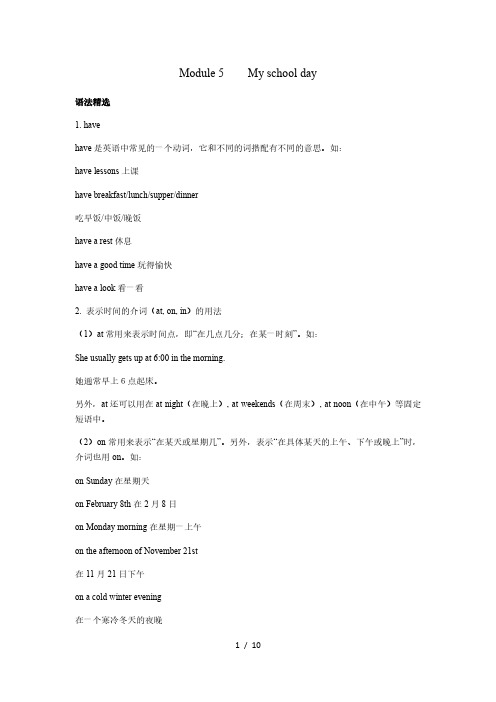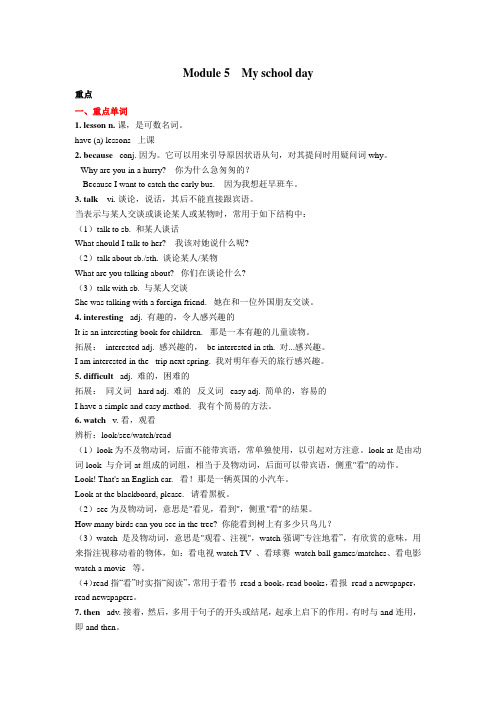外研七年级上册Module 5 My school day模块知识点归纳
- 格式:doc
- 大小:88.50 KB
- 文档页数:5

Key points1、①what 引导的特殊疑问句,what are our lessons 的同义表达what lessons do we have,这两句都可以用于询问“我们上什么课”。
②lesson 作名词,意为“(一节)课”,是可数名词。
Eg :We have an English lesson every day. 表示“第几课”要用“Lesson+基数词”,其中lesson 和基数词的首字母都要大写,基数词也可以用阿拉伯数字来表示。
Eg: Lesson Five.2、①上课 用短语“have+学科名称”或“have a/an+学科名称+ lesson/class ” Eg: have Chinese=have a Chinese lessonhave English=have an English lesson②be good at sth.(do well in ) 擅长某事 be good at doing sth.擅长做某事 Eg :She is good at playing football. =She does well in playing football.3、①because 连词,引导原因状语从句,常用来回答why 引导的特殊疑问句。
Eg: —Why do you like English? —Because it ’s interesting.5、go to school “去上学”,此时school 前不必加任何冠词。
【拓展】go to the school 意为“到那所学校去(不一定是去上学)”。
Eg :They go to the school to watch a football match.【固定搭配】go home 回家 go to college 去上大学 go to sleep 入睡;开始睡觉 注意go home 是动词短语,home 是地点副词。

初一英语上册(外研版)Module 5 My school day知识点总结一、重点辞汇·原文再现It’s half past six.6点半。
·大体用法half n. 一半(复数形式:halves)It took him half an hour to finish the work.他花了半个小时做完这项工作。
I usually go to bed at half past ten.我通常十点半睡觉。
·知识拓展half 可用于表示时间,英语中时间表达法有:1. 表达整点时,用“基数词+o’clock”,其中o’clock可省略。
2. 表达非整点时,可用“钟点+分钟”,意为“几点几分”。
3. 若是分钟数不超过30,可用“分钟+past+钟点”表达,其中past是介词,意为“超过”。
·出题建议进入语法专练模板,选择数词下的“时刻表达法”,勾选需要的题型,如:单选、完成句子等,同时在关键词中输入:half,就可以够找到用half表示时间的题目了。
·原文再现Betty, what are our lessons on Monday?贝蒂,礼拜一咱们上什么课?·大体用法1. lesson n. 课,是可数名词。
I missed a lesson yesterday.昨天我误了一节课。
2. lesson n. 教训,draw a lesson from… 意为“从…中吸取教训”。
We should draw a lesson from failure.咱们应该从失败中吸取教训。
·知识拓展--相关短语have (a) lessons 上课Today we have a lesson in geometry.今天,咱们有一节几何课。
·原文再现Do you like maths, Tony?你喜欢数学吗,托尼?·大体用法like v. 喜欢(过去式:liked 过去分词:liked 此刻分词:liking 第三人称单数:likes)Do you like pop music?你喜欢流行音乐吗?·知识拓展相关句型/结构like to do/doing 喜欢做某事I like to watch movies/watching movies after class.我喜欢下学后看电影。

Module 5 My school day语法精选1. havehave是英语中常见的一个动词,它和不同的词搭配有不同的意思。
如:have lessons上课have breakfast/lunch/supper/dinner吃早饭/中饭/晚饭have a rest休息have a good time玩得愉快have a look看一看2. 表示时间的介词(at, on, in)的用法(1)at常用来表示时间点,即“在几点几分;在某一时刻”。
如:She usually gets up at 6:00 in the morning.她通常早上6点起床。
另外,at还可以用在at night(在晚上), at weekends(在周末), at noon(在中午)等固定短语中。
(2)on常用来表示“在某天或星期几”。
另外,表示“在具体某天的上午、下午或晚上”时,介词也用on。
如:on Sunday在星期天on February 8th在2月8日on Monday morning在星期一上午on the afternoon of November 21st在11月21日下午on a cold winter evening在一个寒冷冬天的夜晚(3)in表示“在某一段时间”,如某年、某月、某个季节。
如:in 1998 在1998年in March在三月in summer在夏天另外,在某一些固定短语中要用in。
如:in the morning在早上in the evening在晚上in the day在白天in the middle of the day在中午句法精析1. What’s the time? 几点了?在英语中,常用“What’s the time?”或“What time is it?”来询问时间,有时也可用“Do you know the time?”等句式来问时间。
回答均用“It’s...”。


Module 5 My school dayI love history.必背单词1.half (n.)一半→halves (pl.)2.difficult (adj.)困难的,难懂的→difficulty (n.)困难3.interesting (adj.)有趣的→interested (adj.)感到有趣的(主语为人) 4.past (prep.)晚于,过(几点)5.o'clock (adv.)……点钟6.to (prep.)(距整点时间)差……7.art (n.)美术;艺术8.geography (n.)地理9.history (n.)历史10.maths (n.)数学11.PE (n.)体育;体育课12.lesson (n.)(一节)课13.then (adv.)接着,然后14.like (v.)喜欢;喜悦15.love (v.)爱,热爱(n.)喜爱;关爱16.subject (n.)科目17.because (conj.)因为18.talk (v.)谈论,说话19.begin (v.)开始20.when (adv.)什么时候,何时必背短语21.on Monday在星期一22.five to nine八点五十五23.have maths上数学课24.talk with...和……交谈25.be good at擅长必背句子26.At twenty past ten we have IT.在十点二十分,我们上信息技术课。
27.Do you like maths, Tony?你喜欢数学吗,托尼?28.I like the lessons on Monday afternoon: English and art.我喜欢周一下午的课:英语和美术。
29.It's my favourite subject because it's very interesting.它是我最喜欢的学科,因为它很有趣。

Module 5 My school day重点一、重点单词1. lesson n.课,是可数名词。
have (a) lessons 上课2. because conj. 因为。
它可以用来引导原因状语从句,对其提问时用疑问词why。
--Why are you in a hurry? 你为什么急匆匆的?-- Because I want to catch the early bus. 因为我想赶早班车。
3. talk vi. 谈论,说话,其后不能直接跟宾语。
当表示与某人交谈或谈论某人或某物时,常用于如下结构中:(1)talk to sb. 和某人谈话What should I talk to her? 我该对她说什么呢?(2)talk about sb./sth. 谈论某人/某物What are you talking about? 你们在谈论什么?(3)talk with sb. 与某人交谈She was talking with a foreign friend. 她在和一位外国朋友交谈。
4. interesting adj. 有趣的,令人感兴趣的It is an interesting book for children. 那是一本有趣的儿童读物。
拓展:interested adj. 感兴趣的,be interested in sth. 对...感兴趣。
I am interested in the trip next spring. 我对明年春天的旅行感兴趣。
5. difficult adj. 难的,困难的拓展:同义词hard adj. 难的反义词easy adj. 简单的,容易的I have a simple and easy method. 我有个简易的方法。
6. watch v. 看,观看辨析:look/see/watch/read(1)look为不及物动词,后面不能带宾语,常单独使用,以引起对方注意。
2017-2018学年外研版初中英语七年级上册重难点精讲Module 5 My school day重难点知识讲解1.It’s twelve o’clock.[译文]现在12点钟。
(1)用英语表达当前的时间常用句型“It’s+时间”。
e.g.—What time is it?/What’s the time?现在几点钟?—It’s ten.现在10点钟。
询问时间可以用以下句型:What time is it?几点了?Wh at’s the time now?现在几点了?What time is it by your watch?你的表几点了?Can you tell me the time, please?请问,你能告诉我几点了吗?Do you have the time, please?请问,你知道几点了吗?(2)o’clock意为“……点钟”,只能用于整点之后,并且可以省略。
—What’s the time?现在几点钟?—It’s nine o’clock. 9点钟。
2.It’s twenty p ast one.[译文]现在一点二十。
twenty past one意为“一点二十”。
在英语中表达时间可用直接表达法或间接表达法。
(1)直接表达法①表达整点时可用“基数词+o’clock”,其中o’clock没有复数形式,也可省略。
one o’clock1点钟eleven o’clock 11点钟②表达非整点可用“钟点+分钟”,两个基数词连用,译为“几点几分”。
7点5分seven five9点25分nine twenty-five(2)间接表达法①如果分钟数不超过30,可用“分钟+past十钟点”来表达。
其中past是介词,意为“超过”。
6点10分ten past six8点18分eighteen past eight②如果分钟数超过30,可用“(60-原分钟数)+to+(原钟点数+1)”来表达,其中to是介词,表示“还差多少分钟到下一个整点”。
Module 5 My school day 知识总结24.一堂有关健康的课 a lesson in good health26.橙汁orange juice27.保持健康keep healthy28.垃圾食品unhealthy foodin good health29 .健康30.为了健康to be healthyHe does well in music.他音乐方面山色。
2.in bed意为“卧床”,指人因病卧床或卧床休息。
on the / one\ bed表示“在某张/某人的床上”,指某人或某物在床上。
go to bed上床睡觉make the/one^s bed整理床铺eg. He is in bed.他卧病在床。
Your book is on the bed.你的书在床上。
三、基本句型1 .对时间提问:What time is it? What5s the time? 回答:It,s + 时间点。
eg. --- What time is it?几点了?--- It's half past eight.八点半了。
2.对星期几提问:What day is it today? 回答:It,s+星期几。
eg. --- What day is it today?今天星期几?--- It's Saturday.星期六。
3.对日期提问:Whafs the date today?今天几号?回答:It,s+日期。
eg. --- Whafs the date today?今天几号?--- Ifs October 27 th.今天是10 月27日。
四、语法1. 一般现在时(1)概念:表示谓语是经常性和习惯性发生的动作或存在的状态。
谓语动词往往是具有一般性,经常性,习惯性和规律性的动作或状态特征。
(2)常见的标志有:always, usually, often, sometimes, seldom, never, every day, every week,every month, every year, once a week, twice a month.(3)谓语动词形式:谓语动词使用原形或第三人称单数形式。
Module 5 My school day【复习目标】1. 熟练掌握本单元的单词、短语和句型。
2. 熟练掌握一般现在时的用法。
【知识要点梳理】重点单词:名词:half一半art 美术;艺术geography 地理history 历史maths 数学lesson (一节)课subject 科目weekday 工作日house 房子;住宅work 学习,工作break (课间)休息evening晚上park 公园face 脸minute 分钟动词:talk 谈论,说话begin 开场start 开场watch 看,观看do 做,干sleep 睡觉wash 洗形容词:difficult 困难的,难懂的interesting 有趣的busy 忙的,繁忙的介词:past 过(几点) to 差……连词:because 因为短语归纳:1.half past six 6 点半2.have Chinese 上语文课3.at eight o’clock 在8点钟4.love history 喜爱历史5.my favourite subject 我最喜欢的科目6.my school day 我的上课日7.get up 起床8.have breakfast 吃早饭9.next to my house 在我家旁边10.have three lessons 上三节课11.have a break 休息一会儿12.go home 回家13.have dinner 吃晚饭14.do one’s homework 做家庭作业15.go to bed 上床睡觉16.go to the park 去公园17.in the afternoon 在下午18.on weekdays 在工作日19.go to sleep 去睡觉20.after school 放学后21.talk to sb.和某人交谈句式构造:What about+v.-ing/n.?……怎么样?经典句型:1.—What’s the time? 几点了? —It’s half past six.6 点半。
Module 5 My school day词句精讲精练词汇精讲1. subject1)subject 为可数名词,意为“学科”。
例如:What’s your favorite subject? 你最喜欢哪一科?拓展:subject 还可以表示“主题、题目、话题”,也可以表示语法中的“主语”的意思。
例如:What’s the subject of the passage?这篇短文的主题是什么?2)中小学常见的科目有:Chinese 语文art 美术music 音乐English 英语science 科学history 历史geography 地理biology 生物physics 物理chemistry 化学computer 计算机2. havehave作为动词,有have和has两种形式,has用于第三人称的单数,have用于其他人称及复数。
have的词义很多,常用以下几种:1)have作为“吃”讲时,常与三餐构成动词词组:have breakfast/lunch/supper 吃(早饭/午饭/晚饭);作为“喝”讲时,构成短语have a drink(=drink)。
2)作为“进行,举行”讲时,构成如下短语:have a lesson 上课have a birthday party 举办生日宴会3)作为“有“讲时,构成:have a yellow bag(有一黄色的包);have a big nose (有一大鼻子)4)作为“经历”讲时,构成:have a good time(玩得开心)= have fun;have asummer holiday 过暑假拓展:动词have与不同的词结合表示不同的含义。
例如:have a meeting 开会have a party 举行聚会have breakfast 吃早饭have a look 看一看have a class 上课have a good time 过得愉快have a talk 交谈have a swim 游泳have a rest 休息一下have a walk 散步have a game 进行一次比赛have a picnic 吃野餐3. difficult/interesting这两个词都是形容词,描述某物的性质或特征,经常放在be动词后面作表语。
Module 5 My school day
I love history.
必背单词
1.half (n.)一半→halves (pl.)
2.difficult (adj.)困难的,难懂的→difficulty (n.)困难3.interesting (adj.)有趣的→interested (adj.)感到有趣的(主语为人) 4.past (prep.)晚于,过(几点)
5.o'clock (adv.)……点钟
6.to (prep.)(距整点时间)差……
7.art (n.)美术;艺术
8.geography (n.)地理
9.history (n.)历史
10.maths (n.)数学
11.PE (n.)体育;体育课
12.lesson (n.)(一节)课
13.then (adv.)接着,然后
14.like (v.)喜欢;喜悦
15.love (v.)爱,热爱(n.)喜爱;关爱
16.subject (n.)科目
17.because (conj.)因为
18.talk (v.)谈论,说话
19.begin (v.)开始
20.when (adv.)什么时候,何时
必背短语
21.on Monday在星期一
22.five to nine八点五十五
23.have maths上数学课
24.talk with...和……交谈
25.be good at擅长
必背句子
26.At twenty past ten we have IT.
在十点二十分,我们上信息技术课。
27.Do you like maths, Tony?
你喜欢数学吗,托尼?
28.I like the lessons on Monday afternoon: English and art.
我喜欢周一下午的课:英语和美术。
29.It's my favourite subject because it's very interesting.
它是我最喜欢的学科,因为它很有趣。
We start work at nine o'clock. 必背单词
1.start (v.)开始→begin(同义词)
2.watch (v.)看,观看→watches(第三人称单数形式) 3.do (v.)做;干→does(第三人称单数形式)
4.sleep (n.)睡觉(v.)睡觉→sleepy (adj.)困乏的
5.weekday (n.)工作日
6.house (n.)房子;住宅
7.work (n.)学习;工作(v.)学习;工作8.break (n.)课间休息
9.evening (n.)晚上
10.homework (n.)家庭作业
11.bed (n.)床
必背短语
12.go to school上学
13.on weekdays在工作日
14.have breakfast吃早餐
15.have lunch吃午餐
16.go home
回家
17.have dinner
吃饭;吃晚餐
必背句子
18.I get up at half past seven in the morning.
我早上七点半起床。
19.My school is next to my house.
学校在我家旁边。
20.We start work at nine o'clock.
我们九点开始上课。
21.In the evening, I watch TV and have dinner with my family.
晚上,我和我的家人一起看电视,吃晚饭。
Language in use
必背单词
1.busy (adj.)忙的,繁忙的→free (反义词)空闲的
2.wash (v.)洗,洗涤→washes(第三人称单数形式)
3.park (n.)公园
4.face (n.)脸
5.minute (n.)分钟
必背短语
6.do exercise 做运动
7.go swimming去游泳
必背句子
8.In the UK, children have five lessons in the day and finish school at half past three in the afternoon. 在英国,孩子们白天有五节课,并且在下午三点半放学。
9.They also do homework like you!
他们像你一样也做作业!。